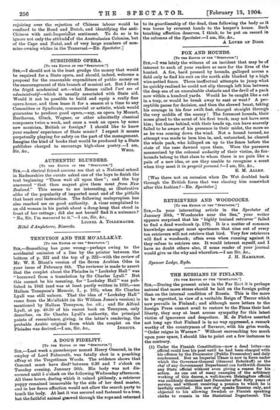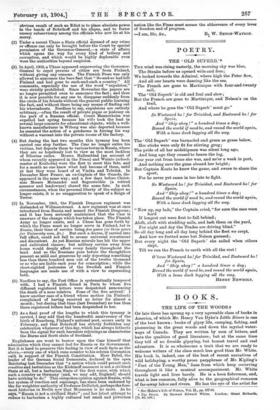THE RUSSIANS IN FINLAND.
[TO THE EDITOR OF THE "SPECTATOR."]
SIR,—During the present crisis in the Far East it is perhaps natural that more stress should be laid on the foreign policy than on the internal condition of Russia. This is the more to be regretted, in view of a veritable Reign of Terror which
now prevails in Finland ; and although mere letters to the foreign Press cannot avail to restore to the Finns their lost liberty, they may at least arouse sympathy for this latest victim of ignorance and despotism. M. de Plehve asserted not long ago that Finland is in no way oppressed, a remark worthy of the countryman of Suvarov, with his grim words, "Order reigns in Warsaw." Without encroaching too much upon your space, I should like to point out a few instances to the contrary.
(1) Under the Finnish Constitution—now a dead letter—no official could lose his post until he had been charged with his offence by the Procurator (Public Prosecutor) and duly condemned. But an Imperial Ukase is now in force under which the Governor-General (General Bobrikoff) or the chef of any Government Department can forthwith dismiss any State official without even giving a reason for his action. As one out of many examples of the arbitrary working of this decree, a well-known Halsin,gfors official was suddenly dismissed last December after forty years of service, and without receiving a pension to which he is lawfully entitled. His new chef speaks Russian only, and objected to his allowing Swedish or Finnish speaking clerks to remain in the Statistical Department. The
obvious result of such an Edict is to place absolute power in the hands of Bobrikoff and his clique, and to foster uneasy subserviency among the officials who now lie at his mercy.
(2) Under a recent 'Ukase a State official accused of any crime or offence can only be brought before the Court by special permission of the Governor-General,—a state of affairs which opens the way for every kind of bribery and corruption, and which would be highly deplorable even were the authorities beyond suspicion.
In April, 1903, a Uka.se appeared empowering the Governor- General to expel persons of either sex from Finland;•without giving any reasons. The Finnish Press was only allowed to announce the bare fact that" So-and-so. had left Finland and had gone to such-and-such a country." All comments, especially the use of the word "expulsion," were strictly prohibited. Since November the papers are no longer permitted even to announce the fact ; and thus it is now possible for any one to disappear suddenly from the circle of his friends without the general public learning the fact, and without there being any means of finding Out his whereabouts. Needless to say, expulsions are entirely arbitrary,—often the result of private pique or jealousy on the part of a Russian officiaL Count Mannerheim was expelled last spring because his wife took the lead in several large concerts for educational objects; while a well- known manufacturer in Wiborg was also deported because he resented the action of a gendarme in forcing his way without a warrant into the private rooms of the factory. ,
(4) But during the last two months this tyranny has been carried one step further. The Czar no longer exiles his victims, but deports them to various towns in Russia, where they are as hopelessly lost to view as the most luckless of Siberian exiles. Messrs. Hallemblad (an account of whom recently appeared in the Times) and Wainio (school- master at Kexholm) were the first to meet this fate, and for a month no one knew what had become of them, until at last they were heard of at Viatka and Tobolsk. In December Herr Fraser, an ex-Captain of the Guards, dis- appeared in the same way; and a few days before Christ- mas Messrs Meinander and Segerstrohle (a retired assessor and landowner) shared the same fate. In such circumstances, when the personal liberty of the subject no longer exists, it is no exaggeration to speak of a Reign of Terror.
(5) In November, 1901, the Finnish Dragoon regiment was disbanded at Willmanstrand. A new regiment was at once introduced from Russia and named the Finnish Dragoons; and it has been seriously maintained that the Czar is unaware of the change which has taken place. The Finnish Army no longer exists, and a Ukase has gone forth by which the Finns must no longer serve in Finland, but in Russia, their time of service being five years (or three years for University men, cto.) But such a decree, if carried into full effect, could not fail to arouse universal resentment and discontent. As yet Russian misrule has hit the upper and cultivated classes ; but military service away from home would deeply affect every family throughout the land. And so the Russians pose before the thoughtless peasant as Mild and generous by only deporting something less than three hundred men out of the twelve thousand or so who are liable each year for conscription ; while the short-sighted jealousies of the Swedish and Finnish languages are made use of with a view to superseding both.
(6) Needless to say, the Post Office is systematically tampered with. I had a Finnish friend in Paris to whom five different registered letters were despatched announcing the death of a near relative. None of the five arrived! I know another case of a friend whose mother (in Finland) complained of having received no letter for almost a month; but during that time (last December) no less than three registered letters had been despatched to her.
As a final proof of the lengths to which this tyranny is carried, I may add that the hundredth anniversary of the birth of Runeberg, Finland's national poet, occurs early in February, and that Bobrikoff has strictly forbidden any celebration whatever of this day, which has always hitherto been the signal for such harmless rejoicings as characterise the Burns and Scott clubs of Scotland.
Englishmen are wont to bestow upon the Czar himself that admiration which they cannot feel for Russia or its Government. But it is hard to.preserve this feeling in view of such facts as the above,—every one of which runs counter to his solemn Coronation oath in support of the Finnish Constitution. Herr Bebel, the leader of the German Social Democrats, declared in the open Reichstag last December that "a nation which could permit such cruelties and bestialities as the Kishigeff massacre is not a civilised State at all, but a barbarian State of the first water, with which such a country as Germany' [and, we may add, England] should hive nothing to d6." This outspoken Opinion against Russia, with her system of reaction and espionage, has since been endorsed by the far weightier authority of Professor Delbrfick, perhaps the fore- most historian in Berlin now that Moramsen is no more. As he says, "Russia is'not a civilised State" ; and her latest attempt to reduce to barbarism a highly Cultured but Small and Pii-werless
sail, trail, sport,







































 Previous page
Previous page